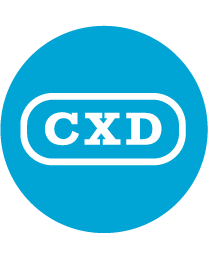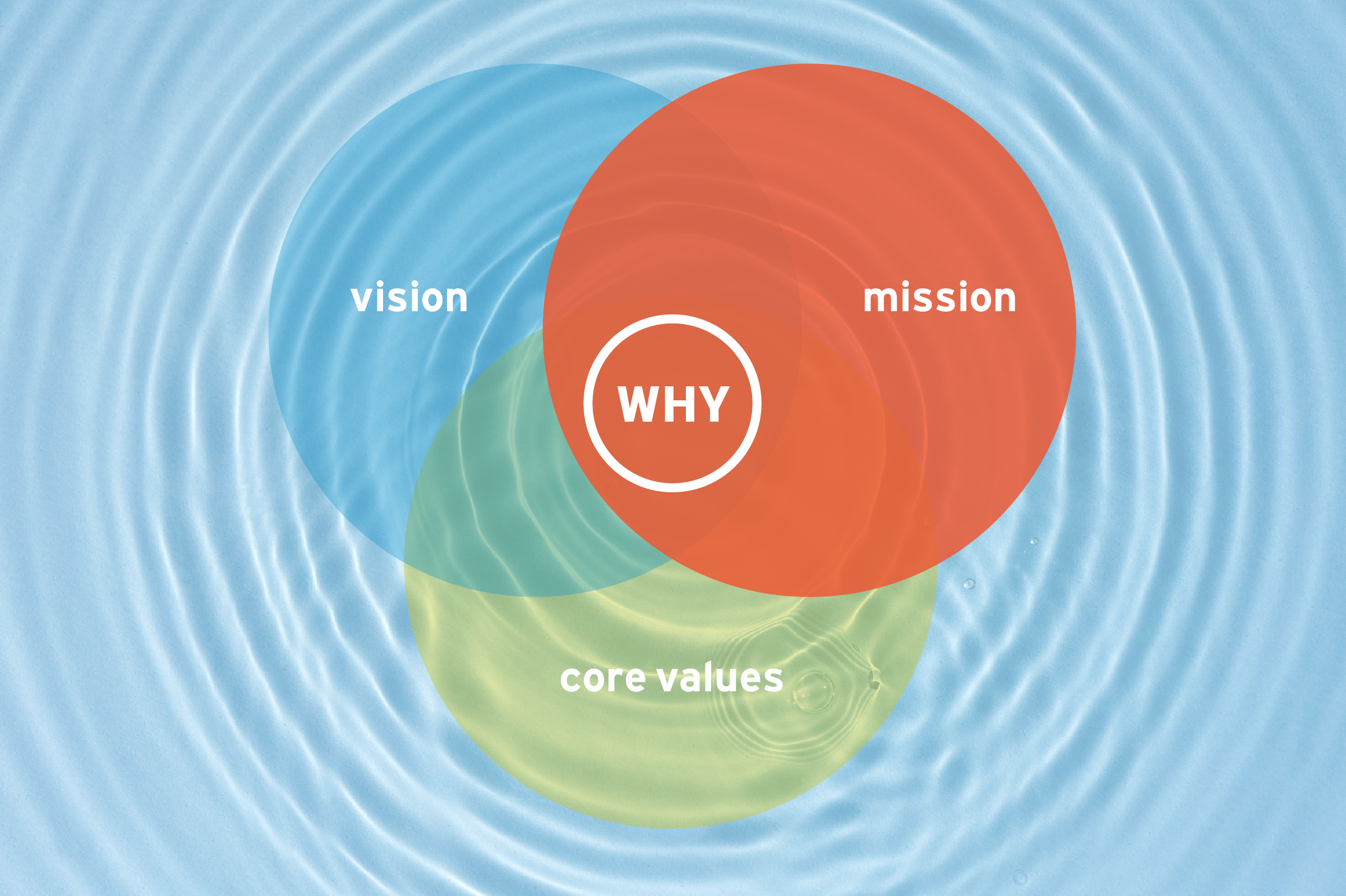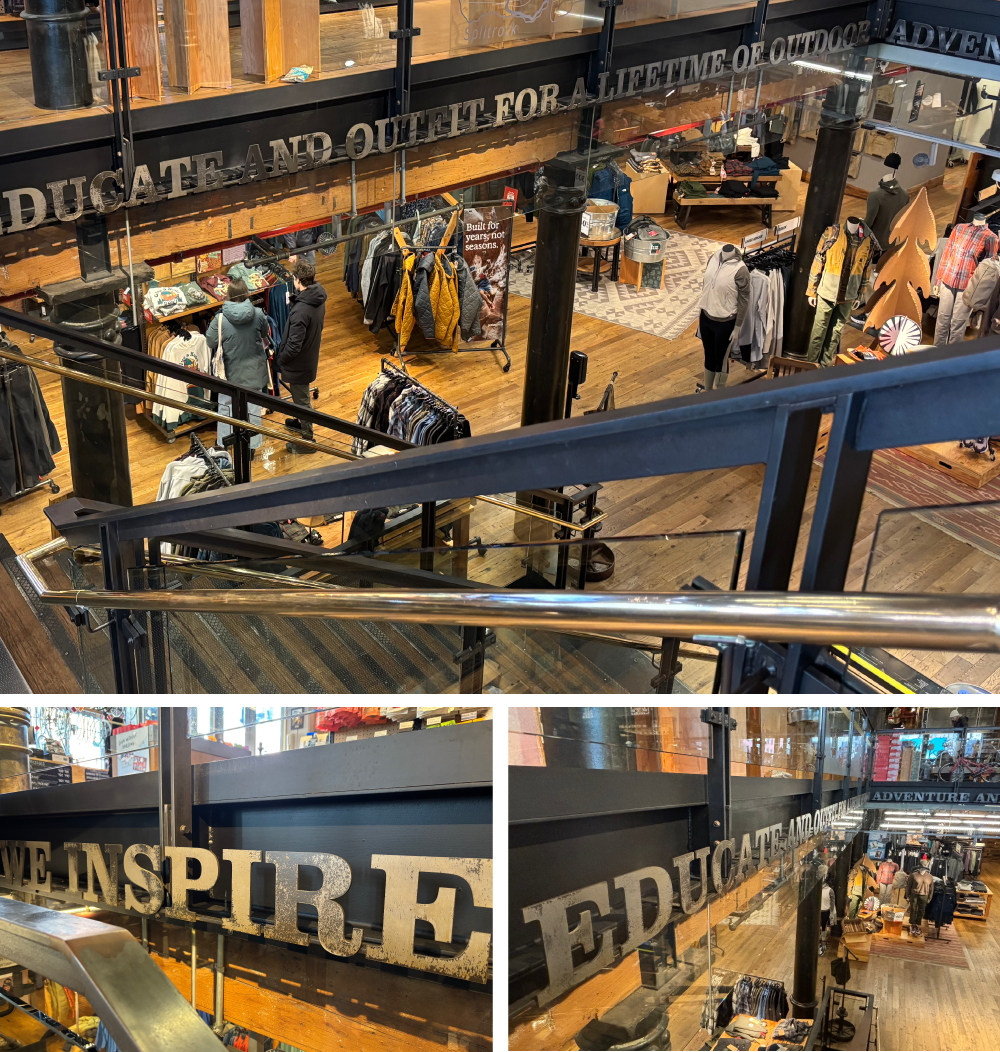Start With Why: Brand Mission
As introduced in Brandology post Values, Vision & Mission
Mission is our proactive role or task in driving our vision forward through a business, nonprofit, professional practice, or consultancy, in keeping with our values — what we intend to do
Our “WHY” is at the center. From there, all else emanates.
Mission Shapes Actions
Mission definition is essential for any business or organization — micro or macro, start-up or established, for-profit or not — and there are many ways to go about it.
Mission Strategy
Mission can be held internally in an organization to inform strategy and guide decisions. It can be also be expressed externally to invite connection, and build loyalty, credibility, and trust.
Mission Presentation
Mission statements range from a brief phrase to an entire paragraph. They are often embedded in an “about” section, or buried on a “careers” page, but they can also be boldly proclaimed as the NYC REI SoHo Flagship store demonstrates.
REI (Recreational Equipment, Inc.)
We inspire, educate, and outfit for a lifetime of outdoor adventure and stewardship.
Mission Messaging
A strong mission statement articulates what your organization does and how it achieves your purpose in a concise and engaging way. Following are some examples. Note that all are about the same length: graspable at quick skim.
Our mission is…
REI (Recreational Equipment, Inc.)
…to inspire, educate, and outfit for a lifetime of outdoor adventure and stewardship by offering quality products, outdoor experiences, and education
Whole Foods
…to nourish people and the planet by offering the highest-quality natural and organic foods available, supporting local farmers, and practicing environmental stewardship
NASA (National Aeronautics and Space Administration)
NASA explores the unknown in air and space, innovates for the benefit of humanity, and inspires the world through discovery.
Tesla
…to accelerate the world’s transition to sustainable energy by producing affordable electric vehicles, solar products, and integrated renewable energy solutions
HubSpot
…to help millions of organizations grow better by providing software, education, and support for inbound marketing, sales, and customer service
WeWork
…to create environments where people and companies come together to do their best work by providing flexible workspaces, shared amenities, and a vibrant community
Peloton
…to use technology and design to connect the world through fitness by providing interactive workouts and high-quality fitness equipment
Blue Apron
…to make incredible home cooking accessible to everyone by delivering fresh, pre-portioned ingredients and easy-to-follow recipes
Levi Strauss
…to sustain our legacy as a global leader in denim by crafting durable, stylish products and promoting sustainability through innovative manufacturing processes
Eventbrite
…to bring the world together through live experiences by empowering creators to organize, manage, and sell tickets for events of all sizes
IKEA
…to create a better everyday life for the many people by offering well-designed, functional, and affordable home furnishings produced sustainably.”
Slack
…to make work life simpler, more pleasant, and more productive by building a platform that connects teams, tools, and workflows
LEGO
…to inspire and develop the builders of tomorrow by encouraging creativity, learning, and play through high-quality toys and engaging experiences
Trader Joe’s
…to give customers exceptional value by curating high-quality, unique products at affordable prices while delivering excellent service in a fun and friendly environment
•••
Communication By Design (CXD)
…to help forward-thinking entrepreneurs (and socialpreneurs) conceive, launch, and grow their companies through creative branding, marketing, and design
Our Own Brand Mission: What? And How?
We can see from the examples above that mission statements are short and sweet. Action-oriented and to the point. As such, they are easier to craft than values and mission statements, but still take focused time and effort. Here are some general guidelines to get you started along with examples of how I did it for CXD (see statement above).
Articulate Your “What”
Clearly state what your company does. Focus on your primary products, services, or expertise.
- CXD: branding, marketing, and design
Incorporate the “How”
Describe how your company does what it does. This might include specific processes, or unique approaches to the way you work.
- CXD: creative
Define a “Who”
If you serve a specific audience, make that clear
- CXD: entrepreneurs and socialpreneurs
Infuse with Meaning
Even though a mission statement is about what you do, you can subtly reflect the Values and Vision you defined in parts 1 and 2 of this Start With Why exercise. Make it authentic to what your business really stands for.
- CXD: forward-thinking
Make It Action-Oriented
Use simple, clean, and clear language that communicates and inspires action
- CXD: conceive, launch, grow
Revise for Simplicity
Cut unnecessary words or phrases. Every word should serve a purpose. The above examples are around 150 to 180 characters (counting spaces).
- CXD: 171
Test for Alignment
Share your draft with clients, colleagues, friends, and family and ask: “Does define my purpose and reflect my identity? Can it inform strategy and guide decisions? Will it invite connection, and build loyalty, credibility, and trust?”
- CXD: Let me know
This post is an entry in Creative Toolbox • Brandology where we share current best practices and emerging trends that inform Communication By Design solutions for your business, nonprofit, professional practice, or consultancy.


